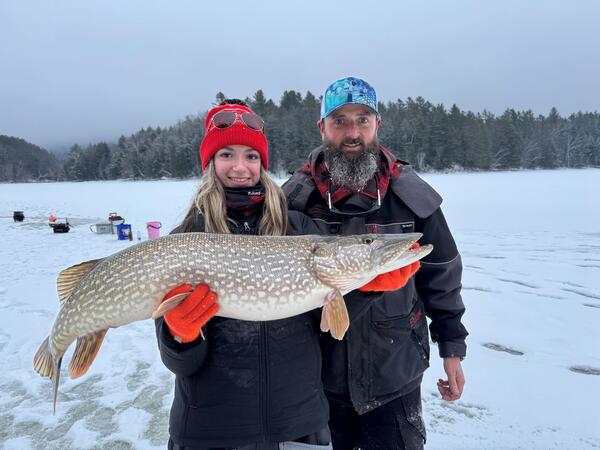You have /5 articles left.
Sign up for a free account or log in.

Launched last summer, Battle Fish University at Paul Smith’s College allows veterans to work toward becoming an outdoor business entrepreneur. The program will expand into Battlefish Academy this summer with a 15-credit credential that can stack into an associate or bachelor’s degree.
Paul Smith’s College
As a student at Paul Smith’s College in New York, Andrew “AJ” Beaudoin was able to do what he loved: spend time outdoors with his young son.
Beaudoin, a disabled Army veteran who suffered post-traumatic stress disorder after leaving the military, found comfort in the great outdoors and guiding others through adventures in nature. After Beaudoin completed his bachelor’s degree, his passion for serving others and nature compelled him to start his own charter business, which he then transformed into a three-day boot camp for other veterans looking to become outdoor entrepreneurs.
This summer, Beaudoin will teach a longer version of his course to a group of up to 35 veterans on the Paul Smith’s campus. The program, Battlefish Academy, transforms veterans’ learned skills as service members into industry knowledge, giving them the confidence to become entrepreneurs, as well as credentials they can build into degrees.
The inspiration: When Beaudoin left the service, he was suffering from PTSD and recovering from a series of strokes. He couldn’t connect his work as a paratrooper to civilian life and felt overwhelmed by the world around him.
He enrolled in Paul Smith’s in 2014, pursuing a bachelor’s in environmental sciences with a concentration in fish and wildlife management. It was one of Beaudoin’s professors who first asked the veteran to lead an expedition to teach his children how to fish.
“I didn’t anticipate it becoming a financial venture for me,” Beaudoin said. “I just wanted to find peace in my heart.”
Beaudoin started his own business, Battle Fish Charters, as an outdoor guide, leading fishing trips for individuals, families and fellow veterans throughout the Adirondacks in 2017. In summer 2024, Beaudoin launched the boot camp, Battle Fish University (BFU), with a small group of veterans who flew to New York from states including Montana, South Carolina and Wyoming.
During BFU—which was sponsored by the Global Center for Social Entrepreneurship Network, the National Center for Veteran Ventures and Paul Smith’s College—students learned first aid, CPR and other requirements to achieve a guide license.
The longer program, Battlefish Academy, builds on the experience, guiding students through applying for and obtaining a license and a certificate.
How it works: The program is 15 credits, which includes a two-week outdoor guide training led by Beaudoin, the inaugural Battlefish Academy director.
In the classroom, students learn the principles of management, marketing and economics, as well as business systems and managerial accounting. They also gain insight into the recreation market in the U.S. and marketing strategies for how to advertise their business and services.
Then academy students spend 14 days learning in an 18-acre lot across the street from Paul Smith’s main campus, where Beaudoin shows them how to tie fishing lines, navigate the wilderness and manage the client experience.

AJ Beaudoin (right), the inaugural director of Battlefish Academy at Paul Smith’s College, leads individuals and groups on ice fishing trips through his business, Battle Fish Charters.
Paul Smith’s College
After completing the certificate, students can stack their credits for an associate or bachelor’s degree in relevant programs, including business, outdoor recreation and eco-psychology.
Participants’ tuition is fully covered by GI benefits, and the college is working with nearby bases to create a pipeline for integrating service members into the program upon their departure from the military.
What’s the need: Beaudoin sees an opportunity to connect veterans’ sense of wellness, community, mission and leadership through an outdoor recreation business.
“I feel like veterans lose their sense of purpose after the service, and that’s a big struggle for us,” Beaudoin said. “So maybe becoming a small business owner could help them.”
About 5 percent of all employer businesses in the U.S. are veteran-owned, with the greatest share related to professional, scientific or technical services, according to U.S. Census Bureau data.
Some veterans, like Beaudoin, leave the military feeling as though their skills don’t apply to civilian life, but Battle Fish helps reframe those ideas.
A Network of Support
In addition to the specialized veteran training of Battlefish Academy, Paul Smith’s College offers military-connected students with a physical Veteran Resource Center that can aid learner completion, with services such as mentorship, networking opportunities and other supports.
“I think that the veteran skill set translates so perfectly from leading a mission in Afghanistan to, ‘Now, I’m leading a family down the river,’” Beaudoin said. “I’m trying to keep them safe and I’m utilizing those same skills that I was trying to keep my soldiers safe with.”
Another benefit is the effect on personal wellness. Spending time outdoors is one way that groups support veterans experiencing PTSD, because it instills a sense of calm and peace.
“There’s so many organizations that take veterans fishing. I want to keep the veterans on the water all of the time,” Beaudoin said.
The program also has the power to connect like-minded veterans, building a network of support and community. During his first Battle Fish University experience, Beaudoin found that veterans share a natural affinity, and he hopes the academy will provide nontraditional learners a similar space to engage with peers.
What’s next: Battlefish Academy will launch this summer at Paul Smith’s with a capacity of 36 beds for the intensive experience.
Beaudoin hopes students leave the experience feeling more confident in starting their own business—and maybe interested in franchising his company, Battle Fish Charters, wherever they call home.
If your student success program has a unique feature or twist, we’d like to know about it. Click here to submit.








